#and then i have to write as much of the thesis as i can
Text
The Three Commandments
The thing about writing is this: you gotta start in medias res, to hook your readers with action immediately. But readers aren’t invested in people they know nothing about, so start with a framing scene that instead describes the characters and the stakes. But those scenes are boring, so cut straight to the action, after opening with a clever quip, but open in the style of the story, and try not to be too clever in the opener, it looks tacky. One shouldn’t use too many dialogue tags, it’s distracting; but you can use ‘said’ a lot, because ‘said’ is invisible, but don’t use ‘said’ too much because it’s boring and uninformative – make sure to vary your dialogue tags to be as descriptive as possible, except don’t do that because it’s distracting, and instead rely mostly on ‘said’ and only use others when you need them. But don’t use ‘said’ too often; you should avoid dialogue tags as much as you possibly can and indicate speakers through describing their reactions. But don’t do that, it’s distracting.
Having a viewpoint character describe themselves is amateurish, so avoid that. But also be sure to describe your viewpoint character so that the reader can picture them. And include a lot of introspection, so we can see their mindset, but don’t include too much introspection, because it’s boring and takes away from the action and really bogs down the story, but also remember to include plenty of introspection so your character doesn’t feel like a robot. And adverbs are great action descriptors; you should have a lot of them, but don’t use a lot of adverbs; they’re amateurish and bog down the story. And
The reason new writers are bombarded with so much outright contradictory writing advice is that these tips are conditional. It depends on your style, your genre, your audience, your level of skill, and what problems in your writing you’re trying to fix. Which is why, when I’m writing, I tend to focus on what I call my Three Commandments of Writing. These are the overall rules; before accepting any writing advice, I check whether it reinforces one of these rules or not. If not, I ditch it.
1: Thou Shalt Have Something To Say
What’s your book about?
I don’t mean, describe to me the plot. I mean, why should anybody read this? What’s its thesis? What’s its reason for existence, from the reader’s perspective? People write stories for all kinds of reasons, but things like ‘I just wanted to get it out of my head’ are meaningless from a reader perspective. The greatest piece of writing advice I ever received was you putting words on a page does not obligate anybody to read them. So why are the words there? What point are you trying to make?
The purpose of your story can vary wildly. Usually, you’ll be exploring some kind of thesis, especially if you write genre fiction. Curse Words, for example, is an exploration of self-perpetuating power structures and how aiming for short-term stability and safety can cause long-term problems, as well as the responsibilities of an agitator when seeking to do the necessary work of dismantling those power structures. Most of the things in Curse Words eventually fold back into exploring this question. Alternately, you might just have a really cool idea for a society or alien species or something and want to show it off (note: it can be VERY VERY HARD to carry a story on a ‘cool original concept’ by itself. You think your sky society where they fly above the clouds and have no rainfall and have to harvest water from the clouds below is a cool enough idea to carry a story: You’re almost certainly wrong. These cool concept stories work best when they are either very short, or working in conjunction with exploring a theme). You might be writing a mystery series where each story is a standalone mystery and the point is to present a puzzle and solve a fun mystery each book. Maybe you’re just here to make the reader laugh, and will throw in anything you can find that’ll act as framing for better jokes. In some genres, readers know exactly what they want and have gotten it a hundred times before and want that story again but with different character names – maybe you’re writing one of those. (These stories are popular in romance, pulp fantasy, some action genres, and rather a lot of types of fanfiction).
Whatever the main point of your story is, you should know it by the time you finish the first draft, because you simply cannot write the second draft if you don’t know what the point of the story is. (If you write web serials and are publishing the first draft, you’ll need to figure it out a lot faster.)
Once you know what the point of your story is, you can assess all writing decisions through this lens – does this help or hurt the point of my story?
2: Thou Shalt Respect Thy Reader’s Investment
Readers invest a lot in a story. Sometimes it’s money, if they bought your book, but even if your story is free, they invest time, attention, and emotional investment. The vast majority of your job is making that investment worth it. There are two factors to this – lowering the investment, and increasing the payoff. If you can lower your audience’s suspension of disbelief through consistent characterisation, realistic (for your genre – this may deviate from real realism) worldbuilding, and appropriately foreshadowing and forewarning any unexpected rules of your world. You can lower the amount of effort or attention your audience need to put into getting into your story by writing in a clear manner, using an entertaining tone, and relying on cultural touchpoints they understand already instead of pushing them in the deep end into a completely unfamiliar situation. The lower their initial investment, the easier it is to make the payoff worth it.
Two important notes here: one, not all audiences view investment in the same way. Your average reader views time as a major investment, but readers of long fiction (epic fantasies, web serials, et cetera) often view length as part of the payoff. Brandon Sanderson fans don’t grab his latest book and think “Uuuugh, why does it have to be so looong!” Similarly, some people like being thrown in the deep end and having to put a lot of work into figuring out what the fuck is going on with no onboarding. This is one of science fiction’s main tactics for forcibly immersing you in a future world. So the valuation of what counts as too much investment varies drastically between readers.
Two, it’s not always the best idea to minimise the necessary investment at all costs. Generally, engagement with art asks something of us, and that’s part of the appeal. Minimum-effort books do have their appeal and their place, in the same way that idle games or repetitive sitcoms have their appeal and their place, but the memorable stories, the ones that have staying power and provide real value, are the ones that ask something of the reader. If they’re not investing anything, they have no incentive to engage, and you’re just filling in time. This commandment does not exist to tell you to try to ask nothing of your audience – you should be asking something of your audience. It exists to tell you to respect that investment. Know what you’re asking of your audience, and make sure that the ask is less than the payoff.
The other way to respect the investment is of course to focus on a great payoff. Make those characters socially fascinating, make that sacrifice emotionally rending, make the answer to that mystery intellectually fulfilling. If you can make the investment worth it, they’ll enjoy your story. And if you consistently make their investment worth it, you build trust, and they’ll be willing to invest more next time, which means you can ask more of them and give them an even better payoff. Audience trust is a very precious currency and this is how you build it – be worth their time.
But how do you know what your audience does and doesn’t consider an onerous investment? And how do you know what kinds of payoff they’ll find rewarding? Easy – they self-sort. Part of your job is telling your audience what to expect from you as soon as you can, so that if it’s not for them, they’ll leave, and if it is, they’ll invest and appreciate the return. (“Oh but I want as many people reading my story as possible!” No, you don’t. If you want that, you can write paint-by-numbers common denominator mass appeal fic. What you want is the audience who will enjoy your story; everyone else is a waste of time, and is in fact, detrimental to your success, because if they don’t like your story then they’re likely to be bad marketing. You want these people to bounce off and leave before you disappoint them. Don’t try to trick them into staying around.) Your audience should know, very early on, what kind of an experience they’re in for, what the tone will be, the genre and character(s) they’re going to follow, that sort of thing. The first couple of chapters of Time to Orbit: Unknown, for example, are a micro-example of the sorts of mysteries that Aspen will be dealing with for most of the book, as well as a sample of their character voice, the way they approach problems, and enough of their background, world and behaviour for the reader to decide if this sort of story is for them. We also start the story with some mildly graphic medical stuff, enough physics for the reader to determine the ‘hardness’ of the scifi, and about the level of physical risk that Aspen will be putting themselves at for most of the book. This is all important information for a reader to have.
If you are mindful of the investment your readers are making, mindful of the value of the payoff, and honest with them about both from the start so that they can decide whether the story is for them, you can respect their investment and make sure they have a good time.
3: Thou Shalt Not Make Thy World Less Interesting
This one’s really about payoff, but it’s important enough to be its own commandment. It relates primarily to twists, reveals, worldbuilding, and killing off storylines or characters. One mistake that I see new writers make all the time is that they tank the engagement of their story by introducing a cool fun twist that seems so awesome in the moment and then… is a major letdown, because the implications make the world less interesting.
“It was all a dream” twists often fall into this trap. Contrary to popular opinion, I think these twists can be done extremely well. I’ve seen them done extremely well. The vast majority of the time, they’re very bad. They’re bad because they take an interesting world and make it boring. The same is true of poorly thought out, shocking character deaths – when you kill a character, you kill their potential, and if they’re a character worth killing in a high impact way then this is always a huge sacrifice on your part. Is it worth it? Will it make the story more interesting? Similarly, if your bad guy is going to get up and gloat ‘Aha, your quest was all planned by me, I was working in the shadows to get you to acquire the Mystery Object since I could not! You have fallen into my trap! Now give me the Mystery Object!’, is this a more interesting story than if the protagonist’s journey had actually been their own unmanipulated adventure? It makes your bad guy look clever and can be a cool twist, but does it mean that all those times your protagonist escaped the bad guy’s men by the skin of his teeth, he was being allowed to escape? Are they retroactively less interesting now?
Whether these twists work or not will depend on how you’ve constructed the rest of your story. Do they make your world more or less interesting?
If you have the audience’s trust, it’s permissible to make your world temporarily less interesting. You can kill off the cool guy with the awesome plan, or make it so that the Chosen One wasn’t actually the Chosen One, or even have the main character wake up and find out it was all a dream, and let the reader marinate in disappointment for a little while before you pick it up again and turn things around so that actually, that twist does lead to a more interesting story! But you have to pick it up again. Don’t leave them with the version that’s less interesting than the story you tanked for the twist. The general slop of interest must trend upward, and your sacrifices need to all lead into the more interesting world. Otherwise, your readers will be disappointed, and their experience will be tainted.
Whenever I’m looking at a new piece of writing advice, I view it through these three rules. Is this plot still delivering on the book’s purpose, or have I gone off the rails somewhere and just stared writing random stuff? Does making this character ‘more relateable’ help or hinder that goal? Does this argument with the protagonists’ mother tell the reader anything or lead to any useful payoff; is it respectful of their time? Will starting in medias res give the audience an accurate view of the story and help them decide whether to invest? Does this big twist that challenges all the assumptions we’ve made so far imply a world that is more or less interesting than the world previously implied?
Hopefully these can help you, too.
1K notes
·
View notes
Text
Metapost: "The Ascendent"
**this is a meta for my fic, Pieces Still Stuck in Your Teeth, and NOT a discussion of the BG3 game canon in any way. If you try and make this into a disk-horse, I will BITE you**
(spoilers under the cut for Chapters 1-23 of Pieces Still Stuck in Your Teeth).
So... remember in the Chapter One endnote when I said I was a Spike/Buffy fan first, and a person second? x
・゚: ✧・゚: ・゚: ✧・゚:・゚✧:・゚・゚✧:・゚
In more seriousness, there was a number of fictional seasonings/ingredients that went into creating what I felt was the villain of a Gothic horror, and what I felt could turn the Ascendent into something that was both 'fixable', and something I enjoyed writing.
Those ingredients were:
Spike and the idea of 'soulless' vampires in the BtVS canon - do I like this conceit of BtVS worldbuilding and how it's used in the show? No. I think it often underlines how bad Whedon is at writing romance. BUT I do think it gives Buffy this free pass for which vampires she can/can't like or adopt, and I needed some of that for my protagonist. I need a 'I can fix him' moment - BtVS has those in fucking SPADES.
Howl's Moving Castle (this one was accidental, I'm still mad at myself but I can't deny it's there) - man conducts magic ritual for power, removing an essential part of himself in the process that needs to be returned
Picture of Dorian Gray (the idea of an exterior staying pristine while something hidden suffers and decays)
Curse of Strahd (the soulless in Barovia, which I mentioned in Chapter 23)
The idea of default moral alignments in D&D. I have a whole chapter arguing against this in my thesis (mostly bc it's often applied to entire races) but I was fascinated by creating a set of circumstances where I feel like a default moral alignment is valid, actually. 7,000 deaths seems like a good set up. I wanted to imagine a being that was trapped within a default moral alignment, and the laws of its very being prevent it from being good no matter what it tries, and it knows that (this kind of creates a feedback loop with the Spike/Buffy stuff)
The parts of the BG3 canon I took and REMADE (I'm stressing this throughout, I was making a horror story and a horror monster your honour):
Astarion conducts the Rite of Profane Ascension with scars on his back, but has to scar Cazador's back personally, suggesting that um... the Rite REALLY SHOULDN'T BE CONDUCTED BY SOMEONE WHO'S GOT THOSE SCARS. Cazador wasn't going to do it that way, is all I'm saying!!
The idea that Ascended!Ending Astarion is a concentrated version of certain traits that have persisted throughout his story - his flirtiness, his understanding of sex as a mechanism and expression of power, his use of a façade as a mask for trauma he refuses to acknowledge.
The lines alluding to dissociation in the brothel foursome, post-Ascension.
The idea that Astarion seduced Tav to survive or protect himself- in my case, because I made the Ascendent empty save for Astarion's survival instinct, the idea that he would gravitate towards Tav as one of his default modes to potentially survive made sense to me - this is why it becomes an obsession.
・゚: ✧・゚: ・゚: ✧・゚:・゚✧:・゚・゚✧:・゚
For me, when writing, the Ascendent is a few things:
An intensification of vampirism in a different, fucked-up direction. Yeah, A!Astarion, you can walk in sunlight and you can eat and drink and don't need blood. But you are still a hungering maw of emptiness that feels like it will never be whole or close and connected to the living - just now in a wildly different, metaphysical/existential direction! Welcome to depression, alienation, and otherness!
A soulless being, that knows it is soulless - that initially was very happy with its life but then as the years passed, increasingly spends its every waking moment knowing there is something innately wrong with it that it can't seem to shake, no matter how much it engages with life and all the pleasures of life. (see the 'every meal without savour' speech)
A magically literal metaphor for Astarion's dissociation in moments of extreme trauma, up to and including the fight with Cazador - essentially, the moments when there is nothing but a performance or an exterior, because the self/soul are suffering and they cant' come to phone right now
Astarion's survival instinct. As I say in Chapter 23 - Mephistopheles thinks it is an empty body, who's performance is trying to deny the reality of it's own existence. Rosalie, who has a bit more understanding of Astarion, sees that the performance is not just a coping mechanism but one of Astarion's main modes of survival. The Ascendent is Astarion's survival instinct/techniques for endurance, without any soul or person behind them to protect. This is how I tried to tie in the flirty, hypersexual persona and wrap it with a bow.
I wanted a monster that was undeniably scary, and monstrous to me (oh? you can't fit in or be happy no matter what you do and no matter how hard you try, and you think there's something intrinsically off? how's that autism diagnosis going Emma) but that I also felt sympathy and true sorrow for. I needed to have motivations for him chasing after Tav that I could write meaningfully from and sympathise with.
Not only has Astarion used Tav as a life-raft once before, they've also proven to be the most secure thing he's ever clung to. Of course a rabid survival instinct Astarion would become obsessed, and see them as a potential solution to the problem (this was then intensified by Rosalie also being a walking, overbearing moral compass, and having bound him in a contract in the first week of living, accidentally - a lawful good immoveable objects meets a default moral alignment unstoppable force.)
...Because I also wanted that moral alignment spice!! Wizards of the Coast, default moral alignment is fucked up actually!!! Imagine something trying so desperately to be good - literally being bound in a pact and having been told to be good - but the laws of the universe and its very essence are like "nah mate, we kind of want to destroy and annihilate everything, we're neutral evil personified". That's scary!! that's fucked up!! that's what a birth from 7000 deaths gets you!!!
・゚: ✧・゚: ・゚: ✧・゚:・゚✧:・゚・゚✧
So, now for the actual timeline, for people who aren't interested in my silly musings but mostly just want answers lmfao.
Rosalie makes the decision not to intervene in Cazador's mansion, making it seem like she'll support whatever decision Astarion will make there.
Rite of Profane Ascension happens. Astarion conducts the ritual, rips his own soul from his body, the Ascendent is born with literally zero context. Mephistopheles is fucked in Cania, because a bunch of stuff has just gone wrong.
(oh, by the way, the Ascendent knows Infernal as a default language. Bc it's born from an Infernal rite.)
The Ascendent is now default neutral evil, and feeling some kind of way. Rosalie and him break up. He's supposed to have everything, but the one thing he thought was a done deal - his most stalwart suppporter - just rejected him.
Netherbrain defeat (the Ascendent is not invited. Imagine being an all-powerful, hypersexual survival instinct vampire, and your ex-girlfriend neither wants you for sex, nor your power.)
Rosalie accidentally binds the Ascendent (a soulless devil) in a pact demanding that he never kill anyone, when that's literally what the Ascendent's new existence/new default moral alignment is driving him to do. Then, she fucks off and goes into hiding.
Well. The Ascendent can just get another wizard, to help him learn all of Cazador's secrets to cope [Hemlock is recruited].
The years go by! The Ascendent is doing sooooo well. Everything is great, guys! I'm rich, I'm beautiful, I have lavish parties and lots of sex - why do I feel nothing? I'm a vampire perfected - I have no hunger for blood, I can walk in the sun, I can enjoy all the freedoms of a living, breathing man - why do I feel like I'm starving? Why does everything turn to ashes in my mouth? I have friends - oops, I've sabotaged all those friendships with my innate neutral evil destruction. Why can't I feel anything? What's wrong with me? I'm doing everything right? Why doesn't it feel that way?
Also, I can't kill anything to feel better about it, because my hidden ex-girlfriend bound me in a pact.
In this time, to reflect the gradual degradation of the Ascendent's happiness and it's increasing awareness that it is something Other and innately wrong, the reflection starts going weird. Starts going strange. Starts getting a bit fucked up. Almost as if, when he looks in the mirror and sees a person, *nothing* should be what's there. Imagine being a spawn who couldn't see your reflection, and then a vampire who could see it's reflection, but knows that they're innately empty. Knows there's nothing there. I'd freak out a little bit about it as well tbh, I'd go a bit tooth and claw and elongated jaw about it.
The Ascendent finally admits that's there must be something kinda fucked about it. Life just ain't working out, lads. He starts looking for any and all impossible cures that will help with the malaise in his soul (and that innate essence problem, caused by default moral alignment). These include: more bad decisions, such as a house in Cania bc the Ascendent is hoping he'll feel more at home with devils than he does with mortals. All it does is make him feel more isolated and alone.
But eventually, he settles on two things! - Wish (Hemlock's idea), and Rosalie (the Ascendent's idea). Clearly, we just need Rosalie back! Her leaving is actually what fucked him up in the first place - none of this existential bullshit! She fixed us one, she can fix us again.
But looking for Rosalie hasn't worked out. In order to get a shot at her, the Ascendent goes and bargains for his own soul from Mephistopheles. Mephistopheles, adding a new sheet in excel titled 'what the fuck happens when i give this soulless monster a soul to play with?', agrees and starts tracking his new data.
Obviously, just putting the soul back in yourself will fix you. But the Ascendent, the nothingness living inside Astarion's body, will die. Taking the soul back would erase itself. The Ascendent - who is survival instinct personified - would never do this.
So instead, it starts interviewing and cannibalising the soul. Bc a soul is what it needs, this is the closest it's ever felt to being alive. Bc it's made this all about Rosalie, he thinks he's found his solution. The chase is making him feel alive again. It's true love, lads! not the soul.
Wish auction happens - the Ascendent is beaten to the punch by some unknown (hot) wizard.
This avenue cut off, the Ascendent makes the decision to try and win Rosalie back.
Astarion advises that to make her come back to the Gate, he should murder a bunch of people. Because this comes from the soul, not the soulless devil nothingness, it circumvents the pact.
...The events of Pieces begin!
・゚: ✧・゚: ・゚: ✧・゚:・゚���:・゚・゚✧
And finally - the Ascendent tries to destroy Jar!Starion for many reasons in Chapter 19:
The Ascendent knows that it dies, if the soul and the body get reunited (or is that constant high alert survival instinct just no longer needed, because the problem is fixed? you decide.)
The Ascendent values Tav above itself. Tav is going to fix them. Astarion believes he could never fix himself.
Dissociation - that soul isn't me. I'm here, looking at my soul. If I get too close, it'll kill me.
Self-hatred - that soul isn't me. That man made a mistake, and I've had to live with the consequences. He doesn't deserve to live, for what he's made me become.
The knowledge that Rosalie/Tav will only ever want that version of him, not the one that's living and breathing, that sees itself as the most wretched, fucked-up version of itself. So... give them no choice. They have to deal with me and love me at my worst.
And if the Rite didn't work - if the version of the Ascendent walking around isn't the best one, and the one people want... what was it all for? Why does the Ascendent feel like this? Why does it have to suffer?
・゚: ✧・゚: ・゚: ✧・゚:・゚✧:・゚・゚✧
....And, that's my little meta post! If anyone has any questions about the timeline or any motivations at any points in the fic, I'm obviously more than happy to explain things via ask/comment, as always!
TLDR: I just wanted to make a Gothic horror. I wanted a dark romance, fucked up obsession vampire/mortal dynamic, but I also wanted a situation that was scary for both Astarion and my Tav. I personally think an Astarion who is so dissociated and separate from reality that he feels that in his bones daily, is scary. It's the lingering impact of the traumas the Rite and those 7,000 souls embodied.
I was literally just trying to make it a horror, for everyone involved.
#metaposts#long posts#my writing#wip: pieces still stuck in your teeth#spoilers!#i've never really explained my writing process before in this depth so... I hope it makes sense!#writing meta
59 notes
·
View notes
Text
My Interpetation of The Southern Raiders: Part 1 – A\ang
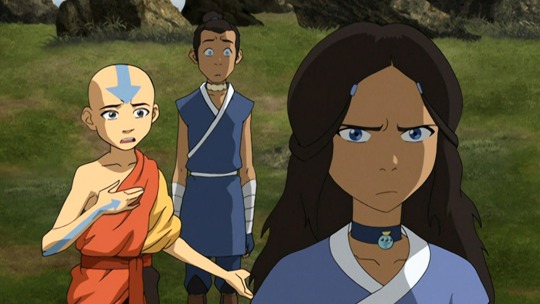
Warning: The views expressed in this analysis will be very critical of Aang. If you aren't critical of him in this episode, you aren't going to enjoy this post. This is your chance to leave. I probably won't have a debate for personal reasons.
——————
The Southern Raiders is probably one of the most discussed episodes in the fandom. Everyone knows Zuko Alone is great, but the discussion surrounding this episode is a war zone. In this essay I will try to answer every question posed in the discourse. This is part 1 out of three. In this part, I will discuss A\ang. I believe that understanding both Zuko and Aang's decisions in this episode will give us great insight into Katara's. Because the this episode is hers.
——————
1. Is Aang's philosophy of forgiveness valid?
(1) "Revenge is like a two-headed rat viper. While you watch your enemy go down, you're being poisoned yourself".
(2) "You do have a choice: forgiveness". // "It's easy to do nothing, but it's hard to forgive". // "Forgiveness is the first step you have to take to begin healing".
This philosophy is indeed morally sound. Revenge comes from rage, a negative emotion that causes harm in the long run. Forgiveness is letting go of that rage, which is healing. I cannot write a full thesis, this essay is not about that. But on paper, I do agree with A\ang. He's right to say that letting go of rage is a better alternative than getting consumed by it. (However, his philosophy might not help some).
——————
2. Was A\ang being insensitive when talking to Katara?
First I must reiterate, a lot of people frame the conflict of the episode as one regarding the ethics of murder. In my interpretation, it is not. During this episode Katara was in a deeply emotional place. Her rage stemmed from intense grief and those around her should treat her as a mourner - with great sensitivity.
Now, was Aang being this sensitive with Katara? Well, in my opinion, very much so.
Imagine a scenario where A\ang just happens to meet Haru, and he's about to go on a quest to find revenge on who imprisoned his father. He tries to help him with the following sentences:
(1) Um ... and what exactly do you think this will accomplish?
(2) Wait! Stop! I do understand. You're feeling unbelievable pain and rage. How do you think I felt about the sandbenders when they stole Appa? How do you think I felt about the Fire Nation when I found out what happened to my people?
(3) I don't think so. I think it's about getting revenge.
(4) Haru, you sound like Jet.
(5) The monks used to say that revenge is like a two-headed rat viper. While you watch your enemy go down, you're being poisoned yourself.
(6) Haru, you do have a choice: forgiveness.
(7) No, it's not. It's easy to do nothing, but it's hard to forgive.
(8) You did the right thing. Forgiveness is the first step you have to take to begin healing.
Everything makes sense, right? The pieces fit.He just talks about his cultura\personal values, nothing about what Katara needs at the moment. He could have had this exact conversation with Haru without changing a thing.
Therefore his lines are impersonal and thus preachy. In this conversation he doesn’t show signs of trying to convince Katara not to end her mother’s killer because she is, fundamentally, a good person and couldn’t live having committed murder. He shows signs of trying to make her obey his cultural ethos. This is highly insensitive. Katara was in a very emotional place, filled with rage and grief. And his response was, intentionally or not, to impose his own cultural principles onto her.
But his lines weren’t insensitive just because they were preachy, some of them were judgmental and even harsh. When A\ang is first confronted with Katara’s intentions, he says:
A\ang: Um ... and what exactly do you think this will accomplish?
You can tell from his tone and how the rest of the conversation plays out that he does know what Katara thinks this will accomplish. He asks the question as a form of disapproval - that he thinks that going after Yon Rha won’t accomplish anything. He’s not being genuine, he’s casting judgment on her. He’s almost looking down on her and Zuko, looking down from a moral high ground and sarcastically interrogating the two. Another line that sticks out is
A\ang: Katara, you sound like Jet.
He says she sounds like the man who wanted to flood an entire village full of innocent civilians. He’s insulting her, and greatly so, all the while wanting to keep a moral high ground. This is incredibly rude and condescending.
In the next scene, right after the intense argument concludes, it appears as though A\ang comes around to the journey Katara was about to go through.
A\ang: I wasn't planning to. This is a journey you need to take. You need to face this man.But when you do, please don't choose revenge. Let your anger out, and then let it go. Forgive him.
While he’s still discouraging Katara, it’s not outright condescending. But it’s as clear as day that he’d just preferred if she didn’t go on the journey at all. When he sees Zuko and Katara taking Appa to find Yon Rha, he says:
A\ang: So you were just gonna take Appa anyway?
Clearly disapproving of Katara. He doesn’t want her to go on the journey to find inner peace, he wants her to forgive the man who killed her mother right here and right now. He couldn’t change her mind on the subject, so he’ll advise her the next best thing. It is worth noting that in the beginning, before he advises her, he cracks a joke.
A\ang: It's okay, because I forgive you. [Pauses.] That give you any ideas?
Overall, A\ang’s behavior is unsympathetic and callous.Instead of placing his focus on Katara’s wellbeing, he preaches about Air Nomad teachings and goes as far as insulting her. Even when he comes around, it’s not because he realized his mistakes, it’s because he knew he couldn’t change her mind. And then he makes a humorous remark while giving him his supposed new found advice. The answer is: Yes. Aang was very insensitive when talking to Katara.
——————
3. Did A\ang know what Katara needed?
I don’t think he did. A\ang thought Katara needed to forgive Yon Rha, and as we previously established, without going after him. But even if we look at his second advice, she still doesn’t follow it.
A\ang: This is a journey you need to take. You need to face this man. [Katara situates herself on Appa's head.] But when you do, please don't choose revenge. Let your anger out, and then let it go. Forgive him.
Katara explicitly didn’t forgive Yon Rha, and yet the whole point of the ending is that she’s in a better place now. No matter what Zuko says, A\ang didn’t know what Katara needed. And considering that his lines in the episode were as impersonal as they were, it isn’t a surprise.
——————
In conclusion, A\ang’s behavior in The Southern Raiders is questionable at best. He might have had pure intentions, and had a good message, but the way he put out the message was degrading and preachy. And in the end, he didn’t know what was the right thing for Katara.
#2. taking over and becoming its own meta lol#also “katara spared yon rha bcs of ang” will be discussed in part 3#anti aang#anti kataang#zutara#<- tagging for reach#atla critical#zuko x katara#katara x zuko#anti anti zutara#pro zutara#zutara analysis#zutara evidence#zutara forever#zutara meta#zutara should have been canon#zutara nation#zutara supremacy#zutara was robbed#zutarian
41 notes
·
View notes
Text
Me:
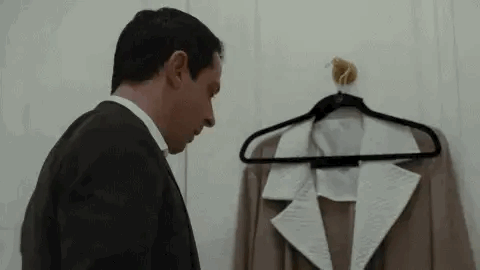
I am so fucking tired and stressed and overworked
#personal#why tf did my uni decide to do so many useless projects and presentations 2 months before i am supposed to defend my thesis#i should be focusing on thesis - i still have around 50 pages to write but noooo#i have essays and projects and presentations and they all are about the same stuff jfc#sorry for ranting but im!!! so tired!! i want to stop crying and throwing up to focus on writing thesis but i cant!!!#i just did an essay on administration things and just found out i have to rewrite the whole page and add another one#and now i need to do a presentation bc my useless uni classmates are gonna claim they dont know how canvas works...#after 2 years of studying marketing??? and working part time in the field???#and then i have to write as much of the thesis as i can#bc on wednesday im going with my mom to the seaside until sunday and then next week i have uni classes on mon and tues#on wednesday i have to do all work bc i plan on destressing by baking a big ass cake for my bday with handmade marzipan figurines etc .u.#the only thing im looking forward to in may
2 notes
·
View notes
Text
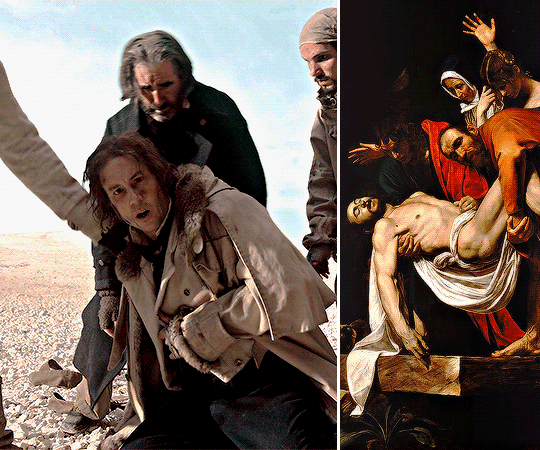
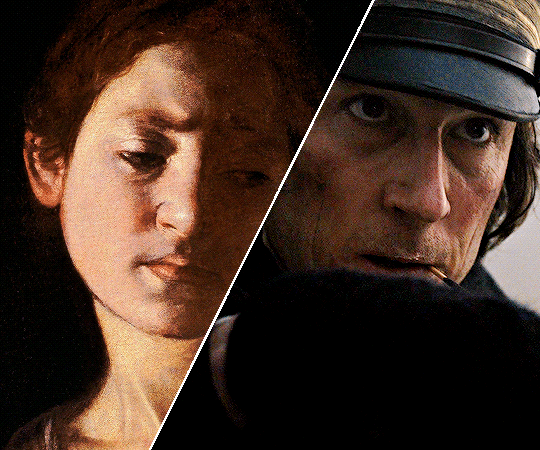
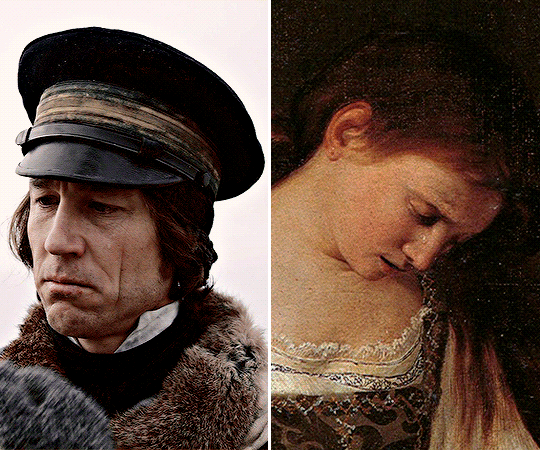

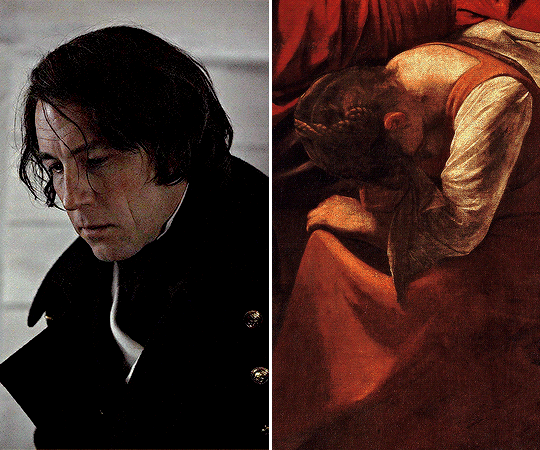
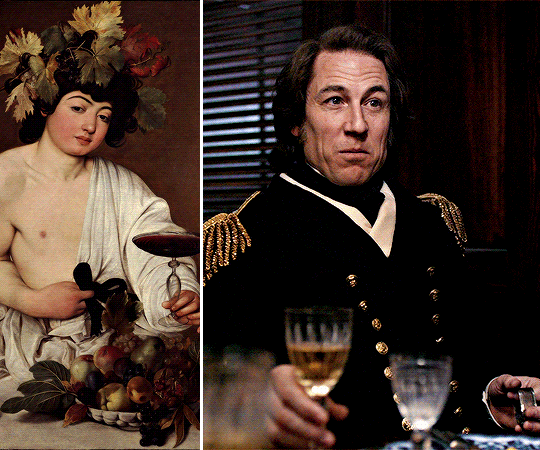
James Fitzjames + Caravaggio's Entombment, David with the Head of Goliath, Penitent Magdalene, The Incredulity of Saint Thomas, Death of the Virgin, Bacchus
#the terror#the terror amc#theterroredit#tvedit#james fitzjames#mine#many thoughts in my brain i could write a thesis for each scene + painting i picked for this#penitent madgalene in particular. i'm not going to spam my own tags but the scene & the painting have an interesting tie in my mind#especially if you know about magdalene at all or caravaggio's choice of models. the rejection of vanity detail in this painting...bellori's#comment 'la finse per maddalena' (he (caravaggio) pretended her to be magdalene)..#so much to say i'm normal about characters and art. anyways. this was originally more elaborate but i literally remade it in smth else#posting it so i can stop obsessing over it
462 notes
·
View notes
Text
We all already know Mizu and Akemi are narrative foils. But you know what? Lemme just say it, here's what I think:
Taigen and Mikio are foils.
Not necessarily to each other as individuals in the way that Mizu and Akemi juxtapose each other, but mostly in the contrast between their relationships with Mizu.
I've covered specific parallels between Taigen and Mikio in other posts I wrote; but as the number of parallels I'm noticing between them keeps piling up, I'm compelled to just compile them all in one post. So! This is, thus, the post in question.
First of all, let's look at their similarities.
1. Their status in society is the same. They are both samurai who lost their honour and have dreams of reclaiming it.
2. They are also both diligent as they strive to achieve this goal, they both care deeply about their work, but here as they begin to contrast, as the work in question and way they go about their goals is different:
For Mikio, his work is in taming and rearing horses; in order to prove himself, he must tame Kai—a willful and strong horse—and present it to his lord.
For Taigen, his work is in sword fighting and martial arts; in order to prove himself, he must kill Mizu—a willful and strong swordsman—and present her dead body to his lord.
In the parallel above, not only are Taigen and Mikio contrasting each other, but Mizu and Kai are placed in comparison as well. And of course, Kai is Mizu's horse, and represents her. Which is why, when later, Mikio sells Kai off, it represents the way he is tossing Mizu (and their relationship) aside.
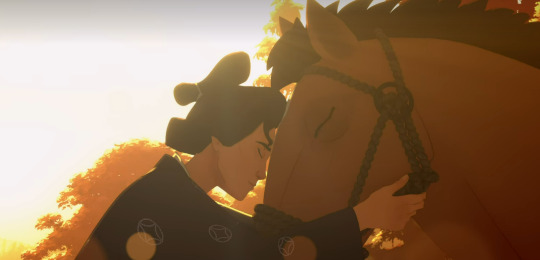
From there, the rest of the details of their character begin to contrast and juxtapose each other more clearly. So let's look at those differences, shall we?
Their backstory:
Mikio was a great samurai who was banished.
A somebody to a nobody.
Taigen was a fisherman’s son who rose to the top.
A nobody to a somebody.
2. The first time we meet them on-screen:
Mikio is an adult. An older man. Mizu's superior in age. He is Mizu's to-be husband. A love interest.
Taigen is a child. A young boy. Mizu's peer in age. He is Mizu's bully. An antagonist.

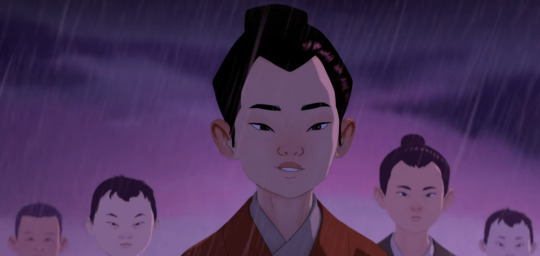
3. Their maturity and growth:
Mikio is mature, but stuck in his ways.
Taigen is immature, but capable of changing and learning.
4. Their overall attitude:
Mikio is generally relaxed, easy-going and unfussy.
Taigen is uptight, irritable and severe.
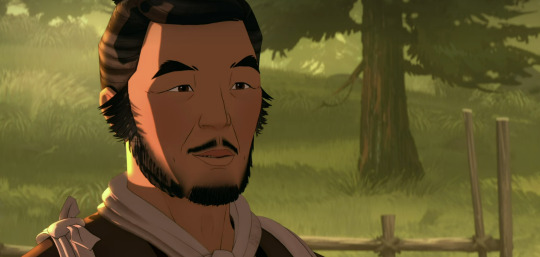
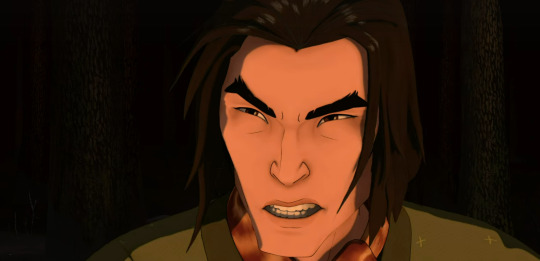
5. How they talk to and conduct themselves around Mizu:
Mikio is aloof, soft-spoken, and serious.
Taigen is obnoxious, brash, and sarcastic.
Mikio is quiet, speaking only when spoken to, even when Mizu turns to smile at him and shows openness to be near him.
Taigen is loud, talking while others are silent, even when Mizu turns from him and shows no interest in conversing with him.

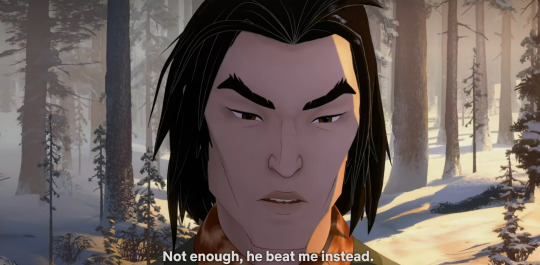
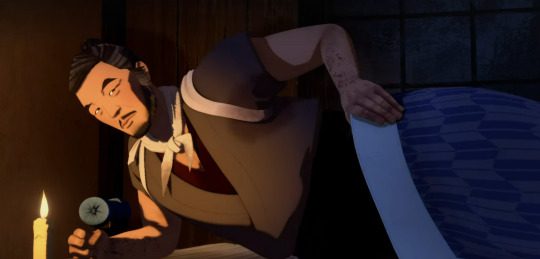

Mikio doesn't show much of who he is to Mizu throughout their marriage, despite their growing affection.
Taigen openly shares his traumas and life story to Mizu during their brief alliance, despite their mutual antagonism.
6. Their external vs internal selves:
Mikio is calm, gentle, and considerate on the outside.
Taigen is hot-headed, rude, and selfish on the outside.
Mikio is cowardly and deceitful on the inside.
Taigen is brave and loyal to a fault on the inside.
Mikio tells Mizu that he wants to know and see all of her.
But he scorns and betrays her, the woman he loves.
Taigen tells Mizu that he wants to duel and kill him.
But he endures torture to not betray him, the man he hates.
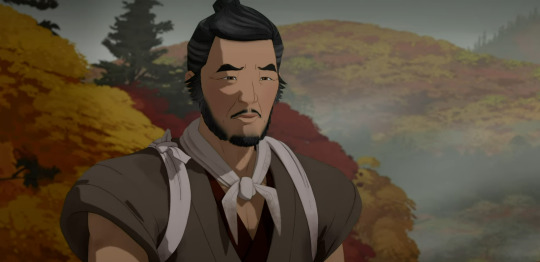
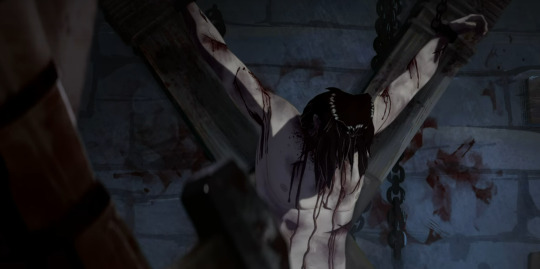


9. Their hair, a symbol of their honour:
Mikio's topknot is untied by Mizu during their spar.
This humiliation occurs in private, the two of them alone in a rural location where no one can see them.
Taigen's topknot is cut off by Mizu during their duel.
This humiliation occurs in public, the two of them being watched by many others in the Shindo Dojo.
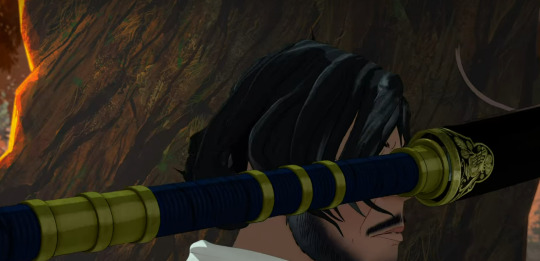
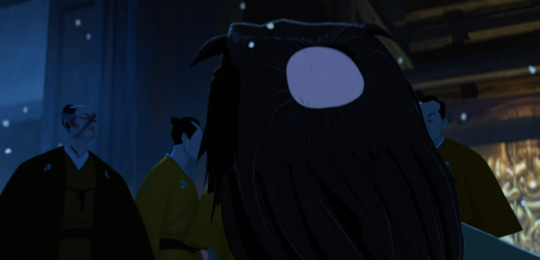
10. Their power dynamic with Mizu:
Mikio believes he is Mizu's mentor.
He teaches her to throw knives, how to ride and care for horses, and about the tactical benefits of using a naginata.
Taigen believes he is Mizu's equal.
He views Mizu as a samurai like himself who received all the same teachings he did, and who possesses the same values.
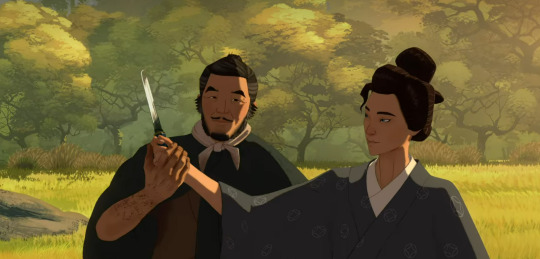
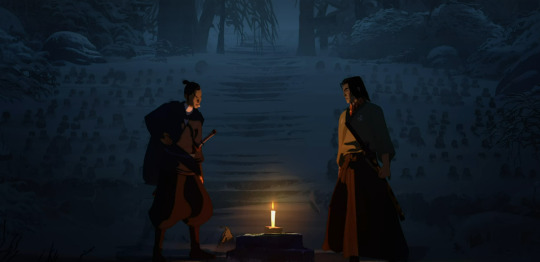
11. Their perceptions of Mizu:
Mikio sees Mizu's feminine side first.
He sees her as sweet and gentle, but also clumsy and incompetent.
Taigen sees Mizu's masculine side first.
He sees her as terrifying and deadly, but also strong and skilled.
12. The way they approach sparring with Mizu:
Mikio only spars with Mizu once. As the fight progresses and she is beating him, he tries to put a stop to it. When she teases/provokes him, he starts taking the fight personally and seriously, finding no enjoyment in it.
Taigen spars and brawls with Mizu all the time. No matter how many times Mizu beats him, he doesn't back down. When Mizu challenges him with a chopstick, he is eager to compete with her and gladly rises up to the challenge.
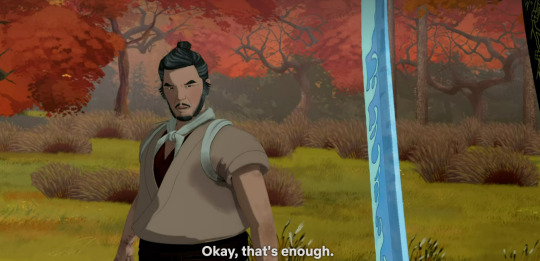
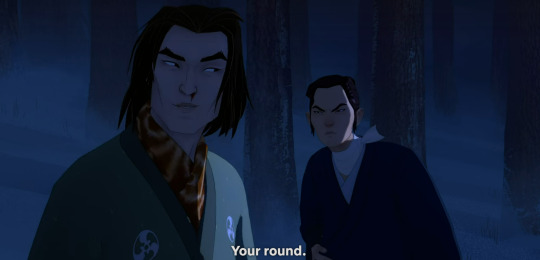
Mikio and Mizu's one and only spar is a friendly match; Mizu is smiling and having fun while he grows increasingly frustrated.
Taigen and Mizu's last-seen spar is a playful wrestling match; both him and Mizu are having fun and laughing.

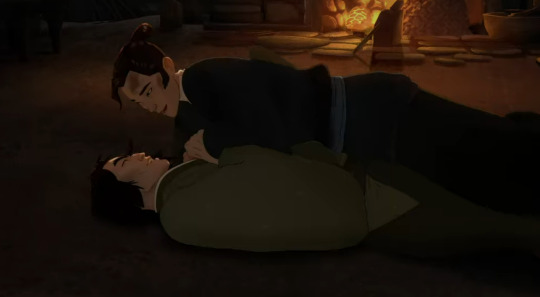
Mikio cannot deal with Mizu being better than him, so he scorns her and walks off, avoiding her thereafter.
When Taigen cannot deal with Mizu being better than him, he follows her to observe her moves and continues training in hopes to eventually beat her.
After being bested by Mizu once, Mikio leaves her and sells the horse he'd previously gifted to her.
After many times losing to Mizu and fighting alongside her, Taigen commends her and admits she is better than him.
13. When Mizu pins them down in a friendly spar:
Mikio sees Mizu's whole face objectively.
Taigen stares at Mizu's mouth and eyes.
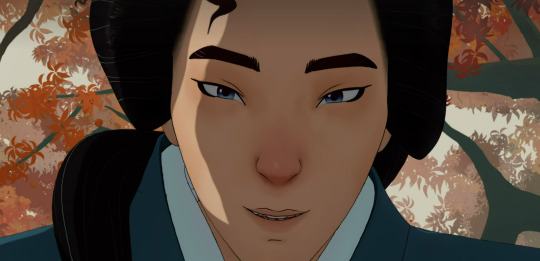

Mikio gets angry when she kisses him, throwing her off of him and snapping at her, calling her a monster.
Taigen gets aroused, apologising, so she pulls herself off of him.
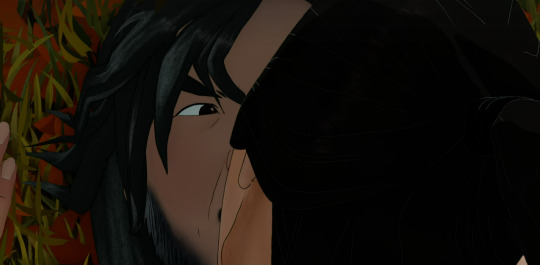
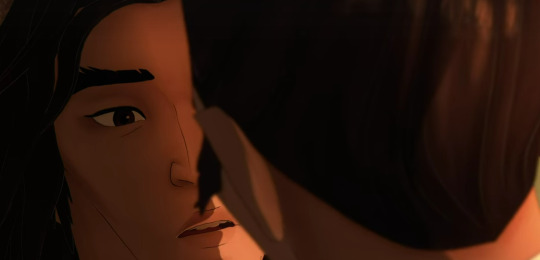
14. Mizu's blue meteorite sword is a reflection of her soul. She believes most are undeserving to face it, let alone hold it. And on that note:
Mikio is the first person (chronologically) that Mizu fights against using her sword.
Taigen is the first person (we see on-screen) that Mizu fights against with her sword.
Mikio is the first person (chronologically) to ever hold her sword, as she passes it to him, letting him wield it.
Taigen is the first person (we see on-screen) to ever hold her sword, as she passes out, and he picks it up and carries it for her.
15. Then, last but not least, in Fowler's fortress, when she is drugged and in pain, she hears Ringo's voice in the dungeon. She then follows it to an open cell:
Mizu first sees Mikio as a hallucination, the sight of him haunting her and causing her to lose her grip on reality. Her eyes glow a surreal blue to represent this.
Her Mama appears then and says Mizu's name accusingly.

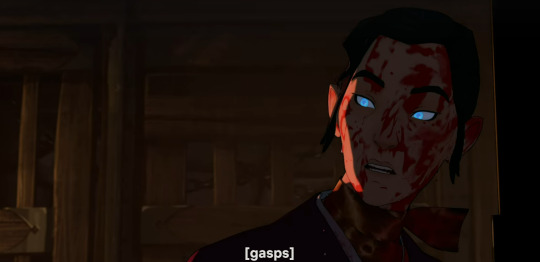
Mizu then sees Taigen, but he is real, the sight of him a relief and grounding her back to reality. Her eyes return to their normal blue colour to represent this.
Taigen looks at Mizu weakly and says her name softly.
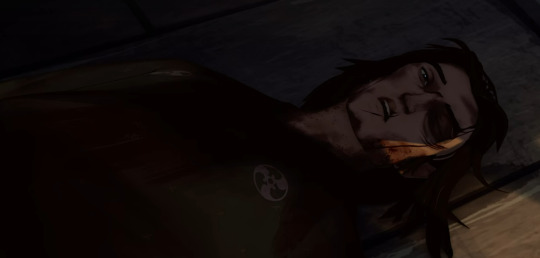

Then, later, when facing Fowler, her revenge awaiting her, she instead chooses to follow her conscience (represented by Ringo's voice in her mind), putting aside her vengeance for a time, in order to save Taigen.
So that's basically all the ones I've noticed so far, but even then, I feel there's already so much that forms a contrast between these two.
What makes it especially incredible about these juxtapositions is that Mikio was Mizu's husband, the man she had fallen in love with, the one person she had ever been intimate with, the man who made her begin to accept herself, to put down her desire for vengeance and instead live a life of peace and happiness.
So for Taigen to have so many parallels with him... Do you see what I'm saying here!
Not to mention that Mizu clearly already has some burgeoning attraction to him, as indicated by how she thinks of him when asked about her desires. And Taigen clearly has shown interest as well (see: him getting a boner after their spar, him holding her hand and telling her, "We're not done yet.").
And on the topic of speculating future possibilities of this relationship, this post by @stromblessed has pointed out yet another parallel between Taigen and Mikio:
Mizu promises Taigen to meet him for their duel in autumn.
Mizu fell in love with Mikio and duelled him during autumn.
With all that said, I do believe Mizu and Taigen's relationship is definitely hurtling towards something. But whether they will actually end up together in a sustainable relationship and have a happily ever after? Well, that is a whole other story; we'll just have to wait and see.
#blue eye samurai#mizu x taigen#taigen x mizu#taimizu#taigen blue eye samurai#blue eye samurai meta#hope yall enjoy my thesis on virgin mikio vs chad taigen#this was written last night when i shouldve been writing the new chapter for my taimizu fic that i promised i would work on....whoopsies...#i will get to it eventually but i just have to get a firmer grip on characterisation before i can delve further into it yk#on that note. i kiiinda regret posting the fic on a whim!#my last longfic was written better because i had the whole thing complete and could go back and edit/polish/revise before posting#so it came out much more coherent and consistent ykwim?#this fic might suffer a bit for this reason 🤒#but its fine i have to remind myself im just doing it for funsies#anyway here have another long ass meta post from yours truly#meta dissertations.pdf#shut up haydar#fandom.rtf
432 notes
·
View notes
Text
Okay, my brain refuses to think about anything other than Murderbot, so I looked at every use of the word "friend[s]" in TMBD and... created some pie charts. Normal human activities.
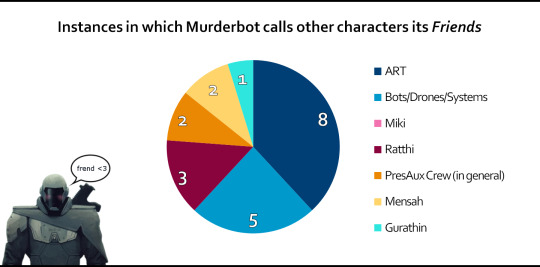


Some Thoughts™ I had while putting this together (under the cut):
In All Systems Red, Murderbot notes that the PresAux crew are all close friends (twice! and goes on to explain their internal relationships which I think is very cute). This is pretty much the only use of 'friends' in ASR, except for when Murderbot says that SecUnits can't be friends with each other.
It seems that this may be one of the first times Murderbot has ever really been around a group of friends before? Murderbot notes that this is not the norm for its contracts and admits that the fact that they are all friends and the way they interact with each other make it actually enjoy that contract (before!!!! the hostile attack, so it already enjoys this contract before they start seeing it as a person etc ghghhhh). [Inference: Friendship seems enjoyable.]
The first character that calls Murderbot its friend is ART in Artificial Condition. Murderbot immediately refutes this (and then goes on to call ART its friend to its clients for the rest of the book). [Inference: Maybe ART is Murderbot's friend. And maybe that is... agreeable]
Rogue Protocol has more than twice as many instances of the word 'friend' as any of the other novellas. Why? Miki. Friendship and its implications for non-humans are a central theme because Miki is friends with everyone. Murderbot initially scoffs at the notion that Miki and Miki's humans are friends. At the end of the book, after witnessing how desperately Don Abene tried to stop Miki from trying to save them, and her grief after its death, Murderbot has to admit that she had in fact been Miki's friend. [Inference: Humans can be friends with bots and can sincerely care about them]
In Exit Strategy, Murderbot tentatively uses the word "friends" for its humans for the first time (several times actually). It questions whether it can actually call them its friends or not and later realizes that it had been afraid what admitting that the humans are its friends would do to it. At the end of the book, Mensah tells Murderbot the PresAux crew are its friends, which is the first time a human has directly said that to it (at least on-page). [Inference: Humans can and want to be Murderbot's friends]
In Network Effect, Murderbot seems to be more habituated to the word 'friend', confidently calling ART and Ratthi its friends, like it is no longer just trying the concept on unsure if it fits. There are many instances in which other characters refer to MB as ART's friend or the other way around and Murderbot's humans refer to Murderbot as their friend several times. Generally, there seems to be less hesitancy, because yes, all of them are Murderbot's friends, why wouldn't they be. [Inference: SecUnits can have friends. This SecUnit has friends. They care about it a lot.]
Conclusion: The Murderbot Diaries tell the story of a construct that does not seem to consider the possibility of friendship for itself and is fine with that - until it accidentally starts caring a little too much and suddenly more and more people annex it as a friend (ew) to the point where it can no longer deny that this is happening and has to begrudgingly admit that yes, it has friends now and maybe that is actually not a bad thing.
#the murderbot diaries#murderbot#𓄿#hi i'm READY to write a thesis about murderbot i am having way too much fun with this#i created a pretty excel spreadsheet and everything#i don't know why i did this but now i can look at them while i think about this more! so i figured i'd share them haha#i didn't count uses of 'friendly' but special shoutout to when MB is all alone in its cold cubicle missing 20% of its body mass#and starts putting on a show because 'the friendly noise would keep it company' 😭😭#i feel sick thinking about murderbot all alone on its own not knowing what its like to have friends watching media for 'the friendly noise'#also YES okay i wanted to make a point about miki there but i just#couldn't bring myself to talk about that more so... yeah#also uhhh this data is very subjective#i didn't count particularly ironic uses of 'friend' and generally did not count every instance of friend and sometimes it was a hard call#also i probably shouldn't have counted the times murderbot refered to drones or secsystems as its friends (often after hacking them)#but murderbot does seem to care about them and shows kindness and respect and sometimes points out that a system is friendly#so while i don't think MB means “friend” in the same way referring to them as when it refers to ART for instance#i still think its CUTE and also kinda funny how many times that happened so i decided to keep those!!!#but yeah take my data with a grain of salt lol
743 notes
·
View notes
Text
the doctor isnt neurodivergent or autistic or adhd or nonbinary or genderqueer or asexual. what the doctor is, is Not From Here
#which necessarily of course says something abt their (non)whiteness#(i had all these words in quotation marks first so mentally add those to whiteness too)#but we've them be black for all of 1.5 episode now so#lets see how that develops you know#also i dont think i understand the politics of that part well enough to say much abt it#not that i probably understand the politics of these parts better but#im annoyed enough abt this Thing happening these years. in these 20s i guess. the 'representation' thing#to complain abt it anyway#the dsm isnt real and it isnt gonna fuck you buddy#maybe i'll read some books and then one day i'll write an essay driven by spite and pettiness#i wonder if i can make the thesis statement about the tension between their status of main character#in a 60 year running family adventure show vs this therapy thing we're doing now#like. you cant do that. in terms of like. what story is and does. what a character is and does. it strains#in an interesting way. like im not saying they Shouldnt have done it. im just observing. that you cant do that really. i think#or maybe you can! but i'll find that out#i also dont know shit abt narratology or whatever so. need to read books first. sigh#always have to pause my thoughts to read myself in first its so annoying. esp bc i rarely really do#bc then new thoughts new things to do you cant do EVERYTHING. you can do almost nothing. bane of my existence really#but like you might even be able to say smth interesting here about whether you can call them traumatised at all#remember that article i saw around on tumblr a few years ago i think that was abt like. some scholar in the middle east maybe#saying that ptsd is a western thing bc it necessitates a Post#all of this is western. psychiatry is western. its all stories. how you conceptualise trauma is a story#whos Other is story#where youre from is a story what you stand for is a story who you are is a story#ah. checked the article. dr samah jabr. palestinian. i'll start with her book maybe
61 notes
·
View notes
Text
alright everybody. its finally time for my ace attorney investigations 2 retrospective/excuse to talk about the von karma-edgeworth family soap opera for a few thousand words. ive never been good at intro paragraphs so we're just gonna get right into it. this is gonna get long probably so be warned - i was originally going to put it under a cut but unfortunately doing that breaks the image format for some reason so uhhhh we're both just gonna have to live with it 😔 obviously this post is going to have major unmarked spoilers so if you havent played this game for some reason yet you should definitely get on that. anyways. without further ado:
investigations 2 is kind of ultimately about who edgeworth was and who edgeworth is and who edgeworth wants to be, explored via the lens of the nature of parent-child relationships and how parents' legacies impact the decisions their children make and the people they become.
at the end of aa1 (+rfta), edgeworth is confronted with the harsh reality that his mentor/adopted father & the man who taught him everything he knows about prosecuting is 1) a terrible person and 2) did actually have a habit of using forged evidence to keep his 40 year streak going. after being accused of corruption for having used fake evidence himself (unknowingly, but still), edgeworth goes on his whole journey of "what does being a prosecutor even mean, anyways" by means of worlds most melodramatic fake suicide. the answer he ends up arriving at is that defense lawyers and prosecutors, when they have relatively upstanding morals and are given the tools to actually do their jobs, serve as vehicles for the truth, and cannot reliably fulfill this duty without each other. however, the question has always kind of lingered - "well, what about being a defense attorney like gregory?"
phoenix routinely brings up the class trial as like the most formative memory of his own childhood - that experience is inherently tied to who phoenix is as a person - but that trial literally only exists because edgeworth was imitating his father in being a defense attorney. the main character of the main series' inspiration for becoming a defense attorney is intrinsically tied to "back when edgeworth was "good", before manfred "corrupted" him". its because edgeworth becomes a corrupt prosecutor that phoenix chases after him into law school - this apparent complete and entire betrayal of phoenix's whole understanding of him as a person.
so then, now that edgeworth is "good" again, why doesnt he quit the whole prosecutor thing and go back to his childhood dream of becoming like his father?
this question is kind of just left up in the air until investigations 2. with the prosecutor investigation committee being completely corrupted, they make it abundantly clear they dont appreciate edgeworth sticking out of line in an attempt to do his literal job, and try to control him by threatening to take away his badge. furthermore, shields, gregory's old companion, shows back up and works with edgeworth to find the the truth of a handful of incidents that would've otherwise been covered up by the p.i.c. - including gregory's last case, in which he proved that manfred, who prosecuted that same case, did indeed forge evidence.
after relinquishing his badge in a protest against what is clearly an injustice, manfred's old habits being dredged back up, and the extended hand of the man in charge of his father's old law firm, edgeworth is getting pulled in a number of different directions - will he capitulate, give up on prosecuting entirely, run away from his past, and become a defender of the people and an attorney like his father? or will he reject manfred's terrible methods while working to rectify his mentor/adopted father's wrongdoings, face his past head-on, and seek the truth as a prosecutor, regardless of his mentor's legacy and reputation?
both of the paths offered to edgeworth hinge on who he used to be - a boy who wanted nothing more than to be like his father, a phenomenal defense attorney who stood up for those who had nobody to stand up for them, and a young adult who saw the injustice in the world and wanted to punish it in the best way he could think of - becoming like his adopted father who never failed to put a (seemingly) guilty person behind bars.
investigations 2 gives us..... a whole slew of parent-child relationships. like what can only be described as truly an impressive amount: gregory & miles & manfred, master & katherine, sebastian & debeste, gustavia & simon, dover & knightley, blaise & sebastian, courtney & john, lang's dad & lang, and more tangentially manfred & franziska and byrne & kay. for our purposes, though, we're going to focus on the most immediately relevant ones to edgeworth's development specifically - sebastian & blaise and gustavia & simon.
for starters, i think it would probably be best to get the von karma-edgeworth family soap opera soapboxing out of the way.
edgeworth's arc in this game primarily revolves around what he wants to do with his life - he talks a whole lot about his "path", but doesnt really know what that means outside of seeking the truth at all costs. the people around him like to slot him into either "defense attorney" or "prosecutor" for a variety of reasons, but more often than not it ends up boiling down to his fathers in at least some capacity.
franziska is personally betrayed and frankly disgusted by edgeworth giving up his badge (which makes plenty of sense, particularly after their conversation at the end of aa2 and which i have talked about here), and a notable portion of that does have to do with her & manfred's relationship to edgeworth. manfred's influence was a huge factor in miles' decision to become a prosecutor, and they both know it. of course, the more pressing issue for her is the fact that miles is abandoning her again - but the point remains that had it not been for manfred, the likelihood of miles becoming a prosecutor would be, frankly, much lower.
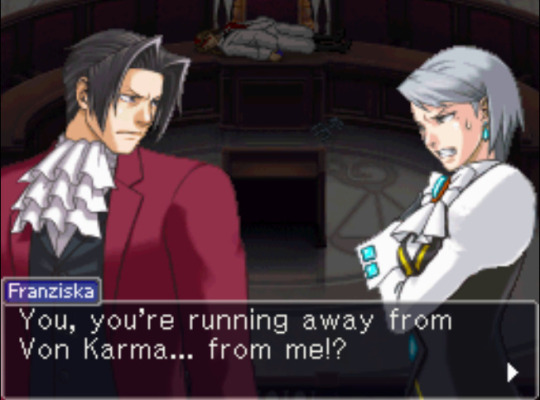
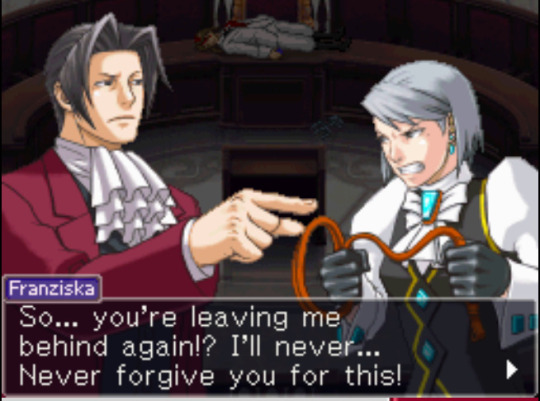
shields, on the other hand, spends a whole lot of the game projecting gregory onto miles. he wants edgeworth to follow in his fathers footsteps and play the role of the returning prodigal son, because he misses gregory and sees a lot of his influence and mannerisms in miles. actually, something i kind of found particularly interesting is that at one point, shields remarks that edgeworth's trademark glare was the same as that of gregory's. theres a whole lot of remarks made on that glare, actually, particularly in combination with edgeworths furrowed brow.
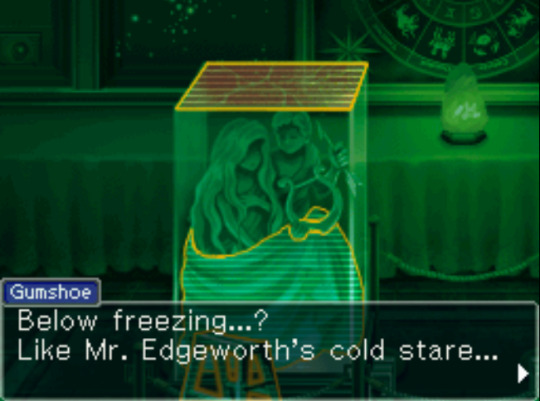
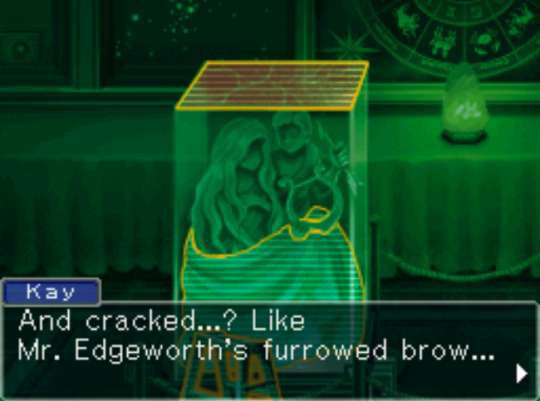
but... shields himself is the one who says this
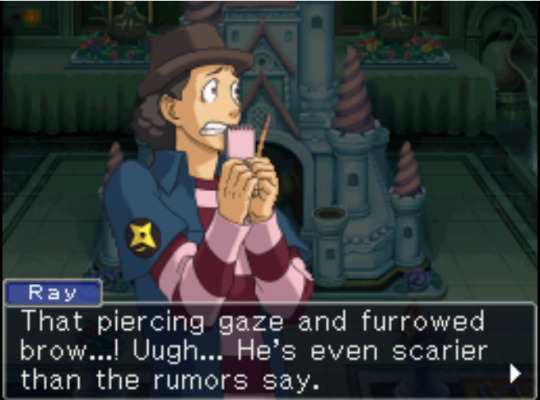
about - would you guess it - a certain manfred von karma. its no secret that miles has picked up a whole number of manfred's mannerisms and attitudes, even as he's unlearning some of the more harmful ones, but what i found particularly fascinating is that shields saw something that miles picked up from manfred and saw gregory in it instead. while part of it certainly could be that miles did pick part of it up from gregory (which is something that has a basis in the sprites - something i may actually get into a little bit later), its also very possible that this is shields projecting what he wants to see onto miles as opposed to what's actually there. its even more interesting though, because when they first meet, shields actually mistakes edgeworth for manfred because of that glare
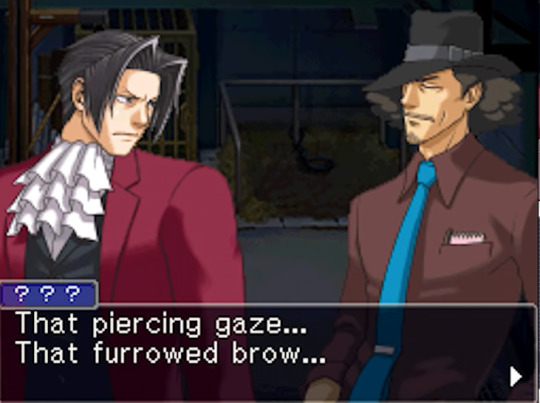
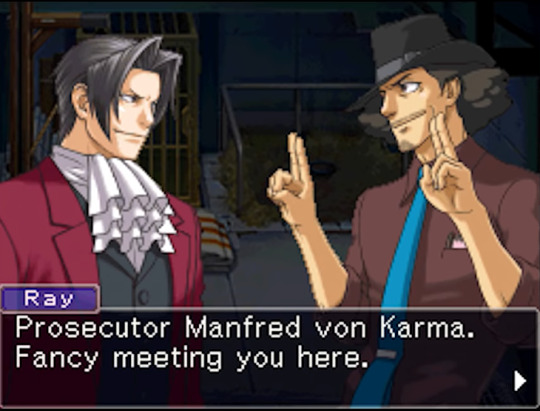
shields is so caught up in wanting gregory back from the dead that he occasionally blinds himself from acknowledging that miles is an entirely different person.
and, of course, throughout both this game and the previous investigations game, there's more than a few moments in which edgeworth personally accused of using falsified evidence to convict people - specifically harkening back to our good friend manfred von karma, posterchild of world's most corrupt prosecutors and edgeworth's adopted father/mentor. shields even expresses immense distrust of miles at first simply on this fact, acknowledging that miles was indeed like a son to manfred (..... for whatever that's worth)
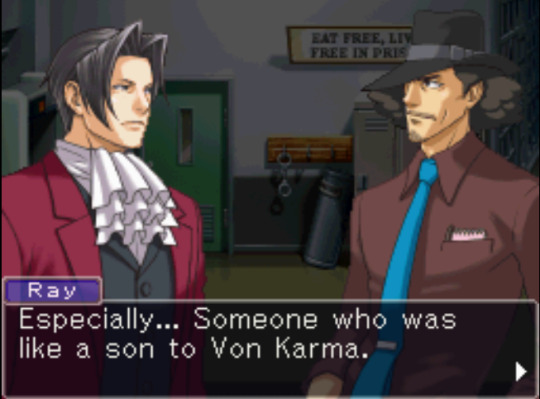
actually. while we're here on this point i want to speak briefly about sprite similarities
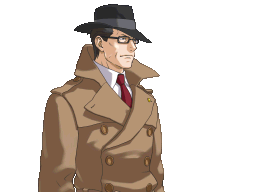
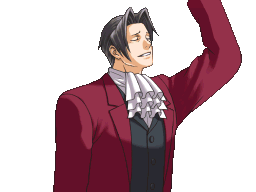
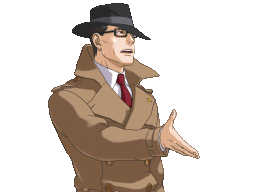
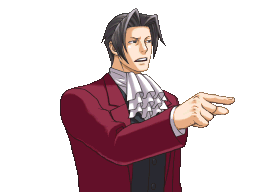
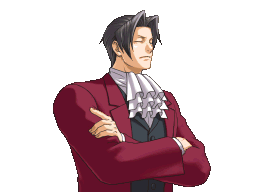
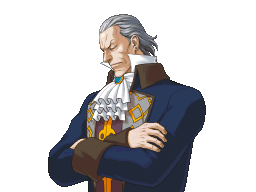

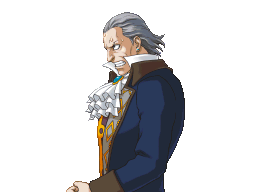
this game does a whole lot of calling attention to the influence manfred & gregory have had on miles - obviously theres the furrowed brow & piercing gaze and terrible people skills that miles got from manfred, but he also has gregory's affinity for tea and dorky camera face. the sprites also do a great job in visually establishing his inherited mannerisms though - while manfred's influence has done a lot, gregory's habits still peek through the cracks.
ive talked about this a little bit on another post, but i feel like it warrants repeating here anyways. the sprite animations in ace attorney are great for a lot of reasons, but one of the most interesting ones is how they're frequently used to imply connections between characters and the influence of certain relationships.
we know that miles definitely did not get his bowing from manfred, but with gregory's sprites in this game it becomes abundantly clear where they originated from (of course, with the over-the-top melodrama of the von karmas added on top). similarly with miles' hand bounding sprite, its a pointed finger (giving it an accusatory tint, definitely coming from manfred), while gregory's is an open hand (much more inviting), but the bounce nonetheless remains. the sprite similarities between miles & manfred are a bit more straightforward, but something i find tremendously interesting is how the mannerisms miles picked up from his father have the von karma influence absorbed into them - it really is a brilliant visual indicator of the impact both his fathers have had on his character.
i've talked about this general topic semi-extensively on this blog simply because i am truly a bit obsessed with the von karma-edgeworth family soap opera, but i feel like it warrants repeating here anyways since it comes up in this came so often. miles' relationship with gregory is... honestly not really explored terribly much? like shields will reference him a lot and both him and the game itself absolutely loves comparing the two, but as far as edgeworth's personal feelings on gregory go... we. honestly don't get much, either directly or indirectly. which makes sense, obviously - edgeworth was like 9 when he died - but its still interesting. we obviously know that gregory loved edgeworth a lot (see: him thinking about miles periodically throughout the investigation . which is. for the record. absolutely adorable)
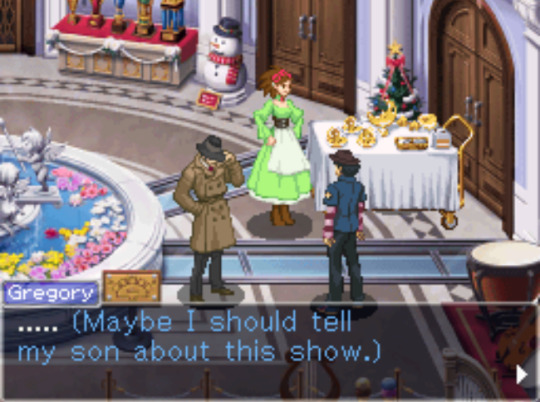
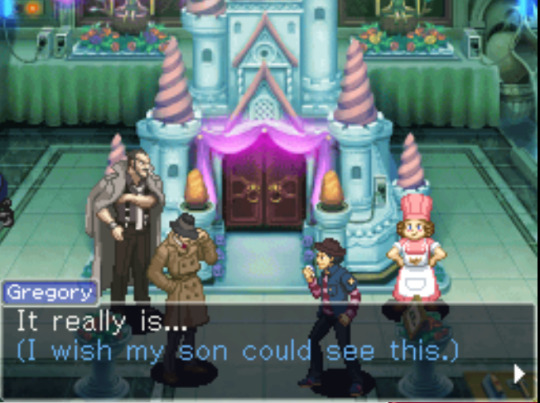
but miles doesn't get much of anything at all in terms of internal or external dialogue about gregory. his relationship with manfred, however, is... a lot more messy, but also explored a fair bit through implications.
mr von karma gets brought up a lot in both investigations 1 & 2, and miles' reaction is largely the same - he'll comment on objective facts (usually ones that were brought up in the first by the people around him) whether its manfred's skill in prosecuting or his tendency towards forgery, but blatantly refuses to ever give any sort of subjective opinion on him (franziska is, for the record, the exact same way). theyll dance around the topic, sure, but never genuinely engage with it - as much can be seen if you make edgeworth present his badge to amano in investigations 1.
while franziska's feelings on her father are a lot more obscured, miles' are a little more openly messy - after all, he still keeps his prosecutors badge in his pocket all these years after manfred told him prosecutors who wore their badges are tacky. he still wears the jabot, an integral and iconic bit of manfreds attire (and another thing that made shields briefly think he was manfred). he still has no problem connecting with and helping manfred's old friends (amano, for example). and, mostly damning of all, he still keeps his old prosecutors outfit - the outfit manfred gave him based off of his own suit - plastered to his office wall. its clear that he doesnt approve of manfred's methods of prosecution and recognizes that he was definitely corrupt, but even with all the murder and framing and so on and so forth... manfred was still his dad. even if its not logical for miles to still hold on to that filial love, you cant really argue your emotions into changing into something rational.
with the repeated importance being placed on the influence of gregory and manfred on miles' life, their relationship to him, and other people's expectations for miles based on their legacies established, i think we can probably try to get into sebastian now. gonna be copy-pasting most of my sebastian vs miles & franziska mini-essay here because i dont want to retype it.
sebastian is actually a kind of interesting foil for franziska and miles - its pretty clear that franziska didnt become a prosecutor specifically for manfreds approval (see: miles’ comment on her always having been a prosecutor) and likewise with edgeworth (see: his statement on his motivation for becoming a prosecutor having been to chase down criminals after what happened to gregory), but throughout the flashback case in investigations 1 it is so obvious that both of them desperately crave manfred’s approval even to the point of competing over it.
while this competition follows the usual format of franziska insisting on something and miles passively going along with it as opposed to actively engaging, he spends the entire case literally trying to be a mini-manfred (its very sad and also kind of cute), and its made pretty clear that at the very least he would not be the prosecutor he is without manfred’s influence. furthermore, at the end of aa2, franziska also comments on the pressures and expectations being placed on her by virtue of being manfred’s daughter - she felt that she was obligated to become a genius prosecutor simply because of her birth. while the wording indicated to me outside pressure rather than manfred specifically, the point remains that manfred, while not the sole driving reason, did have a significant impact on their career choice.
sebastian, however, specifically says he became a prosecutor for the purpose of getting his dad's approval. blaise routinely speaks ill of sebastian, calling him stupid and an idiot and embarrassing and so on and so forth, but its incredibly clear that sebastian is genuinely desperate for any sort of positive affirmation from his father. he unknowingly cheated his way through law school, graduating at the top of his class purely through blaise's connections, and is genuinely distraught when he finds out that everything he built his adult life on was a lie. the game spends a fair amount of time showing you how wildly terrible sebastian is at being a prosecutor, only to reveal that the reason he's like this is, like, 80% his dad's fault.
unlike sebastian, however, franziska and miles are both quite competent at their jobs and manfred, unlike blaise, actually has confidence in their ability to perform to his expectations (see: him bullying badd into letting them try to solve the case in the investigations 1 flashback case). sebastian & blaise are like a worse and caricatured version of the von karma family soap - basically, they're what would happen if miles & franziska 1) were absolutely dependent on manfreds approval and 2) weren't terribly good at prosecuting, and if manfred was 1) prone to coddling and 2) actively verbally abusive.
theres also the added parallel of “oops! my dad actually really sucks as a person” and the ensuing Complicated Feelings On Dad after this. franziska expresses an egregious amount of disdain for sebastian before we really get into the blaise debacle because she doesnt respect him as a person at all, but is honestly surprisingly sympathetic when it turns out his dad is a criminal. futhermore, she willingly relinquishes her place at the prosecutor's bench for him when its clear he's ready to stand up to blaise, even if hes crying and sobbing the whole way through. its this shared experience and his subsequent growing of a spine that earns her respect.

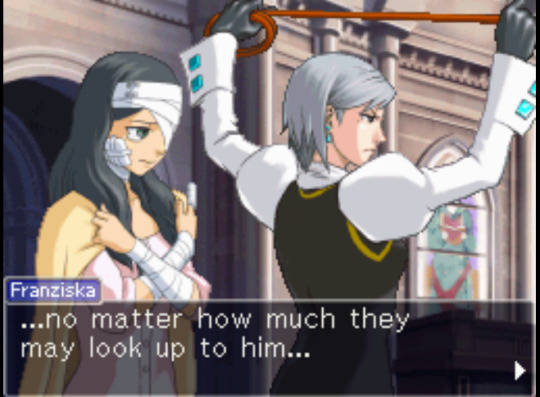
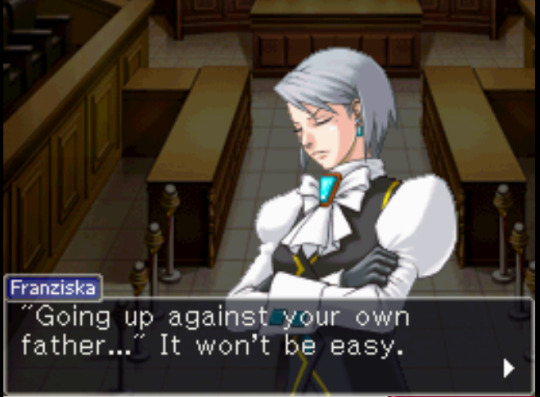
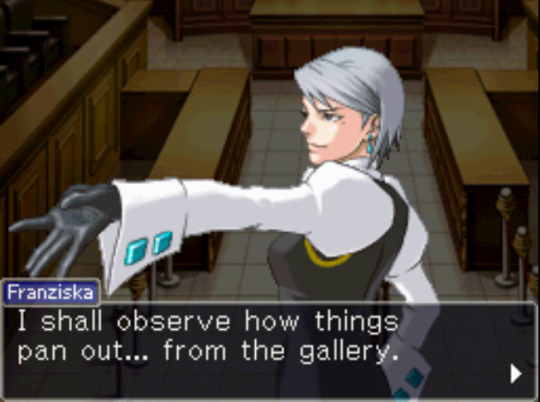
edgeworth, for his part, also doesnt seem to respect sebastian much at all before the kidnapping incident. however, upon trying to prod him into telling what happened, edgeworth recognizes a part of his old self in sebastian, as well as sebastians willingness to grow up and move past his desperation for his father's approval.
more than just being a funhouse mirror version of the von karmas, blaise and sebastians relationship highlights the dangers of blindly chasing after your parents, critical thinking long forgotten, which has a twofold meaning in regards to miles. obviously, theres the pretty straightforward parallel to his blatant idolization of manfred as a young prosecutor - while the situation wasnt necessarily the same, it still possesses those echoes of a desperate need for acknowledgement/approval, to the point of following their fathers' examples even in the worst ways. @/pkducklett left some really great tags on one of my posts which hits the nail on the head:

but it also begs the question: is blindly chasing after his childhood dream of being like gregory really what miles wants to do with his life? a point we'll loop back around to in a bit, but important to keep in mind for edgeworth's overall arc.
so onto simon & gustavia! simon's relationship with his murderous father gustavia also serves as a foil to miles and one of his dads like sebastian & blaise - however, instead of our notoriously trigger happy friend manfred von karma, it's actually.... gregory! which is, for the record, tremendously fun. simon & miles both became orphans at a young age - which is a notable part of the reason edgeworth agrees to take his case in the jail episode, even. the camaraderie between two people who have shared in the same traumatizing experience and so on and so forth - but instead of being taken from his son like gregory was, gustavia purposely abandons simon once he's deemed him worthless.
post-orphaning, both miles & sebastian are taken under the wing of men of questionable character - miles is adopted by manfred von karma, gregory's rival, murderer, and the anti-thesis of everything he stood for, and sebastian becomes the apprentice to dogen, a ruthless assassin. interestingly enough, though, this parallel diverges in the end - manfred throws miles under the bus and backs up over him like three separate times, metaphorically speaking, while dogen actively puts his life on the line to save sebastian.
miles & simon both experienced the injustice of the law system - miles in the absolute failure of the courts to find his father's true murderer, and simon in his personal experience in its utter corruption. their reactions to this injustice leads them both to commit further injustices - miles in uncritically adopting manfred's ideals and teachings, and in this process definitely sending innocent people to jail at some point or another, and simon in his attempt at semi-vigilante justice via manipulating all the people who ruined his life into either ending or ruining each others', regardless of anybody innocent who got caught in the crossfire.
of course, the narrative purpose of making simon a foil to miles is the final confrontation on three main points - 1) what does miles fight for? why is he a prosecutor? 2) how do you deal with the absolutely rotten law system in japanifornia? 3) are we simply doomed to become our parents, or can we become more than just their continued legacies? which naturally leads us to the final question posed in the thesis - the heart of the game - who does miles want to be?
shields spends a lot of time trying to convince miles to pick up gregory's mantle and join him back at the law offices, but the problem is that miles simply isn't the starry-eyed child who would do anything to be like his father anymore (growing up under the roof of one of the greatest prosecutors of one's time will do that to you). he's no longer the sebastian to blaise for either of his fathers - he cannot simply throw everything he's learned and experienced away in an attempt to imitate gregory, but also has soundly rejected many of manfred's most staunchly held ideals. while not all of them remain, a major part of the reasons he became a prosecutor still hold - even as he's abandoned his badge.
simon was what edgeworth could have become under slightly different circumstances, and he says as much himself. he recognizes that the law isn't perfect and more often than not is wildly abused by everybody in power to subject everybody else to their whims - and that, no matter how hard a defense attorney tries.... if the courts are inherently stacked against them, a corrupt prosecutor will inevitably win. at the end of aa2, edgeworth returns from his wildly melodramatic sabbatical with the answer that the prosecution and the defense need to work hand in hand to reveal the truth - which is, obviously, a correct statement - but there's more to it than that.
there's more than just the defendant at stake in trial - the protection of the victims (whether recognized as the victim by the law or not) are why the laws exist in the first place - this is the reason that edgeworth arrives at for his reason for being a prosecutor. its simon who reminds him of why he started down this path in the first place - the visceral pain edgeworth felt at his father's death and the desire for justice to be done for gregory and himself mirroring simon's feelings after being abandoned by his father and his flight after being the witness to a crime wildly corrupt people in power committed. to be what phoenix was for him in turnabout goodbyes - to be a beacon of hope and justice for the wronged - that is miles' duty.
edgeworth speaks a lot about following "his path" to truth, wherever that might lead, but at the beginning of the game doesnt seem to have a clear idea of what he actually wants to do. he stalls out on shields' many wink wink nudge nudge offers to join the defense attorney firm and be like his dad and continues acting like a prosecutor (indicting people, investigating, the likes) even while being stripped of his authority as one (by his own choice!).
ultimately it all boils back down to these three questions miles asks sebastian in the logic chess game post kidnapping - "what are you going to do now? will you walk the same path as your father? will you continue to be a prosecutor?"
much, much earlier in the game, shields says to edgeworth, "to fight crime as a prosecutor, or to save people as a defense attorney. i want you to think carefully about how you want to live your life from now on." - which, taken with the context of the game as an essay on parents and inheritance and manfred & gregory's influence on miles, is... pretty much the game in a nutshell, actually.
miles spends the entire time playing both defense attorney and prosecutor, indicting certain people and defending others throughout. this is arguably most notable in the flashback/flashforward case where all the members of the original is-7 investigation are there, except for manfred and gregory, who are both being stood in for by - would you guess it - our very own miles edgeworth. he is their legacy, their successor, and their inheritor. in the end, he takes the skills they taught him and the values they imbued him with and the lessons he learned from them to forge his own path - it really is just his final answer to shields' question in the finale of the game: "i want to save people as a prosecutor."
#ace attorney#aai2#miles edgeworth#gregory edgeworth#manfred von karma#lorillee.txt#the von karma-edgeworth family soap opera#lorillee liveblogs aa investigations 2: electric boogaloo#ok if i left something out that i wanted to talk about SORRYYYY ive spent too much time looking at this thing and i want it out my drafts#i know this post will probably not get many notes simply because its a bit long but its MY soapbox and ill stand on it if i want to#anyways this game slays its like basically 50% of the ultimate von karma-edgeworth family soap opera thesis#also do not expect me to write anything like this for aa4 5 or 6 im just particularly deranged about this topic and these characters#i think honestly 80% of the reason i wrote all this out is because i know absolutely nobody else is going to do it for me#and i need. to share my vision. with the world. even if its rejected by like 60%-80% of the wider fandom#anyways the one thing this has taught me is that actually i would never be cut out for being a lit major#even for things i want to talk about i spend a million years procrastinating on it. because lord knows i am allergic to writing#also if you have something you want me to elaborate on ask me and i'll see what i can do 😎👍#and be sure to follow me for more insane von karma-edgeworth family soap opera takes
97 notes
·
View notes
Text


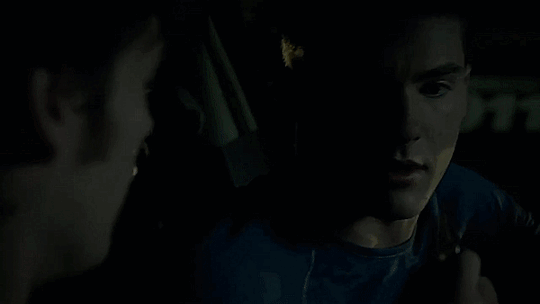
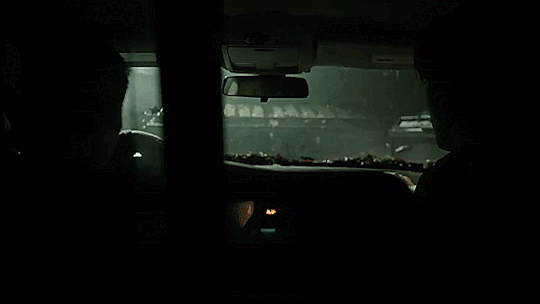






fellas is it gay to touch your arch nemesis at any given opportunity?
#i know the fist bump isn’t technically a touch but it WOULD have been 🙄 so it counts!#also . ab to write a thesis in the tags again but#the fact theo’s arm is still around the back of liams seat when theyre smiling at each other ❤️🩹❤️🩹❤️🩹#idk why thats so important to me but it is!#LIKE YOU CAN SEE HIS SLEEVE THROUGH THE GAP IN THE SEAT….#which means its right there and liam is turned to the side and theos hand is somewhere behind him and 🤕🤕🤕#i am crazy but unfortunately i am not free.#so much to say about this episode.#also their fingers brushing with the key thing also makes me feel like slamming my head into a wall btw#yes i am reading into it too much but isnt that what tumblr is for?#anyways#thiam#theo x liam#theo/liam#theo raeken/liam dunbar#theo raeken x liam dunbar#theo raeken#liam dunbar#teen wolf#6.09 memory found
547 notes
·
View notes
Text
Janeway gets away with so much insane shit because she saw it all when she became a lizard
#she becomes a Borg and fucks with the timeline nonstop and it works every time#every day is threshold day#star trek voyager#threshold day#I have a more extensive write up in my mind#but this is my thesis statement#there's another post saying Tom Paris never gets touched by the Borg cause of threshold#the tiniest incursion factor in relativity? threshold foresight#admiral Janeway's intervention in endgame? threshold foresight#the present the past they're both in the future the future is in the past#it's part of why she's so powerful#can you imagine how much the triplets know? damn they were born with the universe inside of them
25 notes
·
View notes
Text
I went through the day riding on the wave of anger but now it's fizzled out and I'm fucking exhausted and depressed
#there's too much happening everywhere *and* i have a thesis to write#i wish i could die instead#but oh well. what can you do
8 notes
·
View notes
Text
What if I just developed social skills to be able to actually make new friends in person and then used those skills to get a new phone number and pack my bags and run away to a place where no one knows me and all my past mistakes and fuckups and started over there without going into social isolation
#i needed to hand my expose in in february and got an email about it this weekend and agreed to hand it in on tuesday#it is now sunday evening and i just got another email about it but thinking about opening it makes me want to throw up#she's so nice and i don't want to see her scolding me for AGAIN not sticking to a deadline#what if she tells me that was the final deadline and i won't receive a grade for that class and so i won't be allowed to write my thesis#until next january? I wanted to graduate this autumn. it's april and i haven't even started on my thesis and i have like three bullet point#for the expose; and idek if I'll be able skillwise and mental health wise/adhd wise to actually write the stupid thesis#like what if i can't do it and then i've spent the last one and a half years on a degree i won't get in the end and then i won't be able to#apply to a lot of the jobs i thought actually looked good#@god give me some social butterfly skills and I'll give or throw most of my stuff i don't absolutely need away so i can just..#go somewhere new. start over. and not become even more socially isolated than i already am.#does anyone know what a panic attack feels like because i'm having suspicions that i might have finally gotten them this year#but didn't recognise them as such because it could be worse#so anyway. god grant me some social friend making skills#if you can't do that at least throw in some adhd and depression treatment. i am sick of this.#and by this i mean the way i've been living my life at least since i left high school; probably even while still in high school#vent posts#mine#i love my online friends so much but i can't meet them outside to sit in the sun or chat about anything at all or go have coffee together#or or or you get me
9 notes
·
View notes
Text
Laying on the floor rolling around thinking about how awesome it will be once I finish my fanfiction
#it is 30k words long rn and i still have . so much more to write#im excited to post it once its done and edited and revised#it also has an epilogue thats like 1k words long and in letter format#everyones gonna shit their pants once im done#never forget i have a degree in literary composition i can WRITE#i also do academic writing which i adore#if anyone wants my thesis hmu
7 notes
·
View notes
Text
speaking of being slow. i wish i was a faster writer. i can write and i can write well, but it takes me significantly longer than nearly everyone i know. i just cannot get words out as easily as other people seem to and it is so frustrating all the time. i am working on editing my resume right now for applications. this is the third day i have worked on it. all i have needed to do this entire time is change the format to fit grad school rather than a job and add my recent work history. this isn't even two pages long. i have been working on it for 3 and 1/2 hours tonight and it's still not done. ITS NOT EVEN 500 WORDS APPARENTLY. i want to cry
#it doesn't help that the vast majority of my friends are writers or english or lit or poli sci majors#my sister did pr and communications#everyone was always writing papers and presentations and speeches#i VIVIDLY remember my last semester at college sitting down with my sister to do work#cause we were home from covid. and in the several hours we were sitting there she got a seven page paper done#and i didn't even finish one page#i just cannot write the way other people around me seem to be able to#i dont know why it is so much harder for me than other people#i always felt bad when i did group projects because i would be working as hard as i could... and i just wouldn't finish the same amount#as the other people because i just couldn't make the right words that fast#and i am already stressing about it for grad school because everyone talks about how grad school is so paper and presentation focused#people say its easier because you dont have to do worksheets or tests and instead you just have to write#(and im doing a thesis masters so i will have to WRITE)#but... the worksheets and problems and tests are what i am good at#that is what comes naturally to me. noticeably so.#but writing??? i am going to struggle#and i already know it. as always..... why am i doing this again?#why do i think i am going to be good enough for this?? hahaha#god i just need to get this resume done so i can start the painful process of writing my personal statement
7 notes
·
View notes
Text
on the one hand, i am very much a proponent of the "first draft doesn't have to be good, it just has to exist" strategy for writing but on the other hand i'm working on the second draft now and i am Suffering
#writing#writers#grad school#college#student#this is about my MA thesis but it applies to fiction too#also if you're an undergrad reading this i am telling you as a TA: edit your papers. i know it sucks but it helps so much i promise#if you only have time to edit one part it should be the intro#there should be a sentence in there you can stick “i will argue that” in front of and if there isn't you need to add one#this is your thesis statement and even if it's not the best the fact that you have one at all will make your profs and TAs very happy#i just finished marking papers sorry for the tag lecture
14 notes
·
View notes